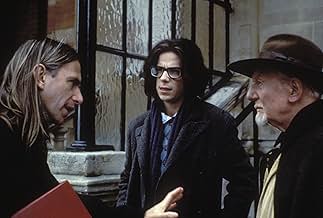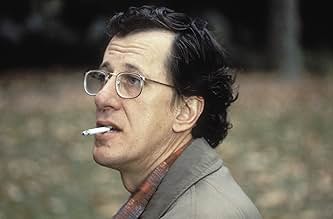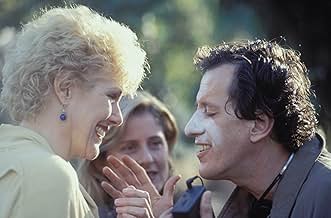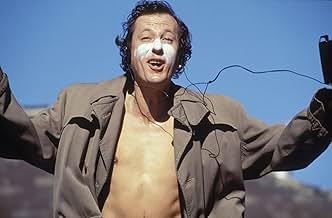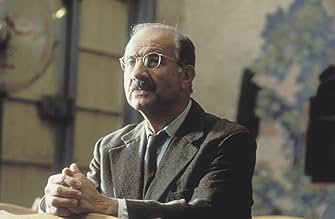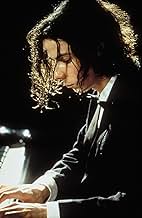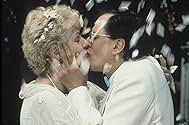Shine
- 1996
- Tous publics
- 1h 45min
NOTE IMDb
7,6/10
58 k
MA NOTE
Le pianiste David Helfgott, poussé à bout par son père et ses professeurs, fait une dépression nerveuse. Des années plus tard, il revient au piano, salué par le public, pour ne pas dire par ... Tout lireLe pianiste David Helfgott, poussé à bout par son père et ses professeurs, fait une dépression nerveuse. Des années plus tard, il revient au piano, salué par le public, pour ne pas dire par la critique.Le pianiste David Helfgott, poussé à bout par son père et ses professeurs, fait une dépression nerveuse. Des années plus tard, il revient au piano, salué par le public, pour ne pas dire par la critique.
- Réalisation
- Scénario
- Casting principal
- Récompensé par 1 Oscar
- 46 victoires et 52 nominations au total
Avis à la une
Okay, so I did some reading after this driven by idle curiosity about the account. The real Helfgott didn't spend 15 years abandoned in a room with a piano, he didn't have to stand in the rain outside of a bar before they would let him in. He was pretty well known in the local scene as a pianist, his father was not a Holocaust survivor and David had been married before. Father and son were never really estranged and David was present at his funeral.
But just the same, the 'objective' point-of-view that purports to explain him, or any of us at any time based on a few facts, is in the end no less hypocritical than any attempt to pass dramatization as 'the real story'. This matters. Someone can be present at a funeral without being truly present, and someone can feel forgotten and alone even when they're factually surrounded by people, estranged from a parent even when formally this was never so.
The film is at a simple emotional level where the attempt to conquer a maddening complexity (music, life) snaps the tethers of mind and in due time the reconfiguring of this damage into blossoming art. The moral is that we must keep trying and hope for the best, perhaps the worthiest lesson even if it appears slightly trite in the context of a more or less happy ending.
Still, why feel the need to invent all those things, knowing you are doing so? When the violence inflicted on the son could be inferred by a more ambiguous tension instead of an outright beating.
Because, it seems, we can only choose to accept the lesson if at the center we find a good soul worthy of the saving. In other words, it is not the fact that he gives a great last recital that matters, but that he plays at all; not that a genius was salvaged because he might never have been that, but a human being. And this is what rankles so much Helfgott's critics who find him borderline incompetent in his playing - he is cheered on in concerts because he is the character from this film.
Ideally we would be able to discern all these points here instead of one harmony: the truly damaged but kind soul, the inability to place blame for that damage on any ogre father or Holocaust, and being able to somehow experience his music (the real Helfgott recorded for the film) as a trained ear would, fixated flourishes followed by distraction and incompetence according to critics, musically extending the damaged self.
For a more demanding film on the same subject of madness and transcendent musical genius see a little known film on a medieval composer called Death in Five Voices: all about the dissonance between different voices trying to harmonize a story and this carried in the music itself.
But just the same, the 'objective' point-of-view that purports to explain him, or any of us at any time based on a few facts, is in the end no less hypocritical than any attempt to pass dramatization as 'the real story'. This matters. Someone can be present at a funeral without being truly present, and someone can feel forgotten and alone even when they're factually surrounded by people, estranged from a parent even when formally this was never so.
The film is at a simple emotional level where the attempt to conquer a maddening complexity (music, life) snaps the tethers of mind and in due time the reconfiguring of this damage into blossoming art. The moral is that we must keep trying and hope for the best, perhaps the worthiest lesson even if it appears slightly trite in the context of a more or less happy ending.
Still, why feel the need to invent all those things, knowing you are doing so? When the violence inflicted on the son could be inferred by a more ambiguous tension instead of an outright beating.
Because, it seems, we can only choose to accept the lesson if at the center we find a good soul worthy of the saving. In other words, it is not the fact that he gives a great last recital that matters, but that he plays at all; not that a genius was salvaged because he might never have been that, but a human being. And this is what rankles so much Helfgott's critics who find him borderline incompetent in his playing - he is cheered on in concerts because he is the character from this film.
Ideally we would be able to discern all these points here instead of one harmony: the truly damaged but kind soul, the inability to place blame for that damage on any ogre father or Holocaust, and being able to somehow experience his music (the real Helfgott recorded for the film) as a trained ear would, fixated flourishes followed by distraction and incompetence according to critics, musically extending the damaged self.
For a more demanding film on the same subject of madness and transcendent musical genius see a little known film on a medieval composer called Death in Five Voices: all about the dissonance between different voices trying to harmonize a story and this carried in the music itself.
"Shine" is one of the great movies of the '90's, that became an unexpected success in 1996 and was the movie that earned Geoffrey Rush his as of yet only Oscar win and got the movie 6 more Oscar nominations, including best director and best picture.
The movie shows how Australian born David Helfgott gets formed and influenced in his early life by his demanding and abusive father (wonderfuly played by Armin Mueller-Stahl), who is in strict control of the family. He asks a lot from the already very unstable David and influences ever step in his life, probably also to make up for his own shortcomings in life. He's an unpredictable character with two faces and you can really feel the fear he puts in the family and David in particular. Things go worse and worse mentally for David as he grows up and eventually goes to study in England at the Royal College of Music. He has a breakdown which for once and for all definitely labels him as a psychotic man. His personality could definitely been described as crazy.
He gets perfectly and beautifully portrayed by Geoffrey Rush, who truly deserved the Oscar he received for his role. But in fact he is only in the movie for perhaps halve the running time. For "Shine" uses lots of flashbacks about Helfgott's early life and as a young adult, when he is being played by different actors. One of those actors is the know very well known Noah Taylor, who also plays the part fine. Also really impressive is Armin Mueller-Stahl. He doesn't usually have very big parts in English spoken movies but in this movie he plays one of his bigger and more interesting roles. It's a true memorable performance from him and he also truly deserved his Oscar nomination for this movie. I keep thinking it's a great shame he got discovered so late by the big-money movie industry, since he is already close to 80 by now, which should mean that his biggest and greatest roles should already be behind him by now. But who knows, some actors just go on forever, till a very old age. Take for instance John Gielgud, who also stars in this movie. At the time he was already well over 90 years old and he would continue to play on in many more great and big productions, till his death in 2000. Some actors are just truly born as actors. It simply is in their blood and they can't stop playing.
Moments in Helfgott's life are never portrayed too long but also never too short. This means that the story always comes right to the point and doesn't dance around it. The movie becomes very effective because of this and on top of that gets presented with a good steady pace. It's a reason why this movie is really one of the better autobiographic movies ever made. It's a really great directed and told movie, from Scott Hicks.
But of course like every good biopic, the movie doesn't only presents facts and some things are altered, in order to enhance the movie and its story or characters. For instance right after this movie the real Helfgott became a true full God, while in all honesty David Helfgott is a great piano player but just not the genius one as portrayed in this movie. It's kind of like the piano man. The mysterious mute man who was found in Kent England in 2005. It was said he was a brilliant piano player, while in fact he just simply knew how to play a piano well but was by no means a great or professional player. Just like David Helfgott, it are just the unusual circumstances and character personalities that makes people say they are geniuses, rather than it's an objective reflection of their actual qualities. But like I said, this isn't anything unusual to do for a biopic, to play around a little with the facts and it certainly is no objection when it actually enhances the movie. "Shine" truly benefits from its approach and story.
I also enjoyed David Hirschfelder nice little musical score (also Oscar-nominated). Of course the movie also benefits from it's classical compositions that are being featured. It's of course a very musical movie, since it's about the life of a musician but you really don't need a classic musical lover to enjoy or to appreciate this movie though.
The movie ends quite abrupt and perhaps not satisfying enough but this is of course simply due to the fact that David Helfgot is still alive and active today. Who knows, perhaps they could had better waited for another 30 years to come up with a movie about his life, for who knows what more strange and beautiful moments his life shall know.
Perhaps it's not the most stylish or greatest made movie but the combination of the interesting unique story, pace and main character (and of course Geoffrey Rush his performance of him) are what makes this movie such a basically flawless (you simply just forgive the movie for its flaws and shortcomings while you're watching it) and captivating one to watch.
10/10
http://bobafett1138.blogspot.com/
The movie shows how Australian born David Helfgott gets formed and influenced in his early life by his demanding and abusive father (wonderfuly played by Armin Mueller-Stahl), who is in strict control of the family. He asks a lot from the already very unstable David and influences ever step in his life, probably also to make up for his own shortcomings in life. He's an unpredictable character with two faces and you can really feel the fear he puts in the family and David in particular. Things go worse and worse mentally for David as he grows up and eventually goes to study in England at the Royal College of Music. He has a breakdown which for once and for all definitely labels him as a psychotic man. His personality could definitely been described as crazy.
He gets perfectly and beautifully portrayed by Geoffrey Rush, who truly deserved the Oscar he received for his role. But in fact he is only in the movie for perhaps halve the running time. For "Shine" uses lots of flashbacks about Helfgott's early life and as a young adult, when he is being played by different actors. One of those actors is the know very well known Noah Taylor, who also plays the part fine. Also really impressive is Armin Mueller-Stahl. He doesn't usually have very big parts in English spoken movies but in this movie he plays one of his bigger and more interesting roles. It's a true memorable performance from him and he also truly deserved his Oscar nomination for this movie. I keep thinking it's a great shame he got discovered so late by the big-money movie industry, since he is already close to 80 by now, which should mean that his biggest and greatest roles should already be behind him by now. But who knows, some actors just go on forever, till a very old age. Take for instance John Gielgud, who also stars in this movie. At the time he was already well over 90 years old and he would continue to play on in many more great and big productions, till his death in 2000. Some actors are just truly born as actors. It simply is in their blood and they can't stop playing.
Moments in Helfgott's life are never portrayed too long but also never too short. This means that the story always comes right to the point and doesn't dance around it. The movie becomes very effective because of this and on top of that gets presented with a good steady pace. It's a reason why this movie is really one of the better autobiographic movies ever made. It's a really great directed and told movie, from Scott Hicks.
But of course like every good biopic, the movie doesn't only presents facts and some things are altered, in order to enhance the movie and its story or characters. For instance right after this movie the real Helfgott became a true full God, while in all honesty David Helfgott is a great piano player but just not the genius one as portrayed in this movie. It's kind of like the piano man. The mysterious mute man who was found in Kent England in 2005. It was said he was a brilliant piano player, while in fact he just simply knew how to play a piano well but was by no means a great or professional player. Just like David Helfgott, it are just the unusual circumstances and character personalities that makes people say they are geniuses, rather than it's an objective reflection of their actual qualities. But like I said, this isn't anything unusual to do for a biopic, to play around a little with the facts and it certainly is no objection when it actually enhances the movie. "Shine" truly benefits from its approach and story.
I also enjoyed David Hirschfelder nice little musical score (also Oscar-nominated). Of course the movie also benefits from it's classical compositions that are being featured. It's of course a very musical movie, since it's about the life of a musician but you really don't need a classic musical lover to enjoy or to appreciate this movie though.
The movie ends quite abrupt and perhaps not satisfying enough but this is of course simply due to the fact that David Helfgot is still alive and active today. Who knows, perhaps they could had better waited for another 30 years to come up with a movie about his life, for who knows what more strange and beautiful moments his life shall know.
Perhaps it's not the most stylish or greatest made movie but the combination of the interesting unique story, pace and main character (and of course Geoffrey Rush his performance of him) are what makes this movie such a basically flawless (you simply just forgive the movie for its flaws and shortcomings while you're watching it) and captivating one to watch.
10/10
http://bobafett1138.blogspot.com/
SHINE (1996) **** Geoffrey Rush, Noah Taylor, Alex Rafalowicz, Armin Mueller Stahl, Lynn Redgrave, Sir John Gielgud, Googie Withers. Excellent Oscar nominated bio pic about acclaimed Australian pianist virtuoso David Helfgott (played equally brilliant by Rush {deservingly winning the Oscar as Best Actor} as an adult, Taylor as a young man and Rafalowicz as the child prodigy) who suffered mental anguish thru his art largely due to his overbearing father (Mueller Stahl, Best Supporting Actor nominee, in a demanding yet effective role) that led to his nervous breakdown that nearly destroyed him. Poignant and beautifully directed by newcomer Scott Hicks (Best Director nominee), the film never panders, preaches or offers any simple answers yet does depict mental illness earnestly with devestating clarity. Rush gives a bravura performance that deserves a standing ovation. Best sequence: the lead-in to Helfgott's crash as he attempts the monumental musical challenge, Rachmaninoff's Piano Concerto #3, or notoriously known as "The Rach 3".
This is a good film in every sense but will mean most to fathers with strong views :).
The story of a brilliant young pianist whose relationship with his father drives him to some sort of mental illness. Watchable, absorbing, brilliantly edited, deeply seriously moving, one of the rare films that pays attention to incidental sound. Wonderful direction and acting. This is a seriously good film.
The story of a brilliant young pianist whose relationship with his father drives him to some sort of mental illness. Watchable, absorbing, brilliantly edited, deeply seriously moving, one of the rare films that pays attention to incidental sound. Wonderful direction and acting. This is a seriously good film.
David is a stuttering, rambling man having suffer a complete breakdown as a young man. However when he was a child his skills on the piano were unmatched. Driven by his father, opportunities open up in front of him to go abroad to learn, but his father denies him the chance. He leaves for London where he drives himself to the point of exhaustion before coming back home to find his father has disowned him.
It took me years to finally watch this film. I was still in Northern Ireland when it came out in the cinema and such films were not permitted to cross our borders, lest they keep the latest action movies from our 1 or 2 screen cinemas! So away from the hype and the Oscar hoopla I sat to watch this film and found myself easily taken in by it. The story is the true story of David Helfgott who was a boy genius before his breakdown. The film starts with him as an adult then jumps back to see him as a child. This approach works well to allow us to see the `end result' as it were, before we see what would be considered the causation factors. These factors are a little heart breaking to watch but they are very well delivered. As an adult, David is comic, warming and tragic. The pain in his life is brought out very well.
A great deal of the praise for this must lie with the wonderful cast. Rush got his Oscar of course and I'll leave it to the users on the message boards to argue over whether or not you can be the lead actor with screen time of less than half the film! He is great, walking a difficult line with a `disabled' character but managing not to just make it a caricature at any point. David as a child is very well played by Rafalowicz and does more of the development work than Rush and hence gets less credit than he deserves for making us care for the adult David. Mueller-Stahl is as good as he can be and gives a great performance, the only downside being that he doesn't age a single day between the adult and child sections of the story - surely some makeup could have been used?
Overall this is a very enjoyable human story that is driven by several really strong performances in key roles. The story keeps it's tone light but yet still manages to be dramatic and, in some scenes far too touching to avoid being slightly moved. The music is beautiful when it is called on to be and dramatic at other times - the director does very well to make the intense music translate into intense scenes in the film. Overall a simple story of a man but one that is interesting and a lot more moving that I expected it to be.
It took me years to finally watch this film. I was still in Northern Ireland when it came out in the cinema and such films were not permitted to cross our borders, lest they keep the latest action movies from our 1 or 2 screen cinemas! So away from the hype and the Oscar hoopla I sat to watch this film and found myself easily taken in by it. The story is the true story of David Helfgott who was a boy genius before his breakdown. The film starts with him as an adult then jumps back to see him as a child. This approach works well to allow us to see the `end result' as it were, before we see what would be considered the causation factors. These factors are a little heart breaking to watch but they are very well delivered. As an adult, David is comic, warming and tragic. The pain in his life is brought out very well.
A great deal of the praise for this must lie with the wonderful cast. Rush got his Oscar of course and I'll leave it to the users on the message boards to argue over whether or not you can be the lead actor with screen time of less than half the film! He is great, walking a difficult line with a `disabled' character but managing not to just make it a caricature at any point. David as a child is very well played by Rafalowicz and does more of the development work than Rush and hence gets less credit than he deserves for making us care for the adult David. Mueller-Stahl is as good as he can be and gives a great performance, the only downside being that he doesn't age a single day between the adult and child sections of the story - surely some makeup could have been used?
Overall this is a very enjoyable human story that is driven by several really strong performances in key roles. The story keeps it's tone light but yet still manages to be dramatic and, in some scenes far too touching to avoid being slightly moved. The music is beautiful when it is called on to be and dramatic at other times - the director does very well to make the intense music translate into intense scenes in the film. Overall a simple story of a man but one that is interesting and a lot more moving that I expected it to be.
Le saviez-vous
- AnecdotesGeoffrey Rush had once learned the piano up until aged fourteen. He took up piano lessons again thirty years later for this movie and also acted as his own hand double and body double.
- GaffesThe character shows all signs of schizophrenia; not bipolar disorder (formerly known as "manic-depressive disorder"), as is claimed in the film. The real David Helfgott likewise displays many symptoms of schizophrenia and none of bipolar disorder.
- Citations
Cecil Parkes: You must play as if there's no tomorrow.
- Crédits fousHimself: hand double for Geoffrey Rush
- Bandes originalesWith A Girl Like You
Written by Reg Presley
© 1966 Dick James Music Limited
Performed by The Troggs
© 1966 Mercury Ltd. London
Meilleurs choix
Connectez-vous pour évaluer et suivre la liste de favoris afin de recevoir des recommandations personnalisées
- How long is Shine?Alimenté par Alexa
Détails
- Date de sortie
- Pays d’origine
- Sites officiels
- Langues
- Aussi connu sous le nom de
- Tỏa Sáng
- Lieux de tournage
- Sociétés de production
- Voir plus de crédits d'entreprise sur IMDbPro
Box-office
- Budget
- 5 500 000 $US (estimé)
- Montant brut aux États-Unis et au Canada
- 35 892 330 $US
- Week-end de sortie aux États-Unis et au Canada
- 162 179 $US
- 24 nov. 1996
- Montant brut mondial
- 35 999 121 $US
- Durée1 heure 45 minutes
- Couleur
- Mixage
- Rapport de forme
- 1.85 : 1
Contribuer à cette page
Suggérer une modification ou ajouter du contenu manquant





